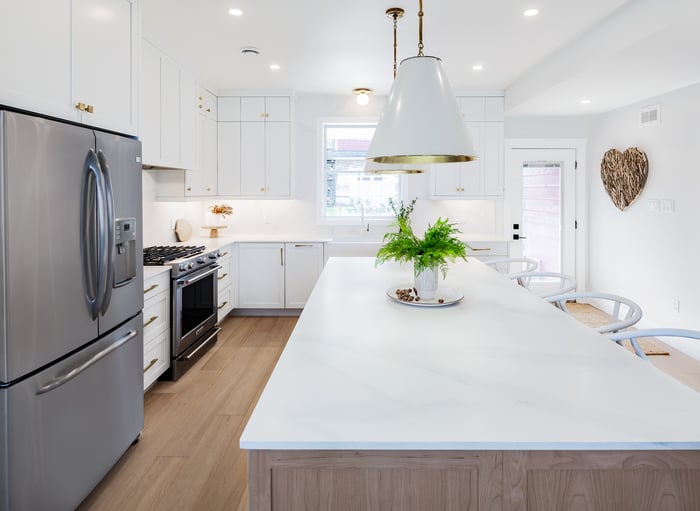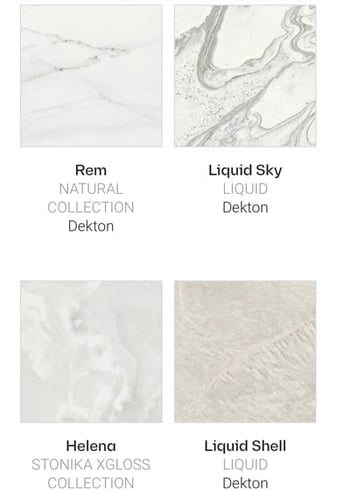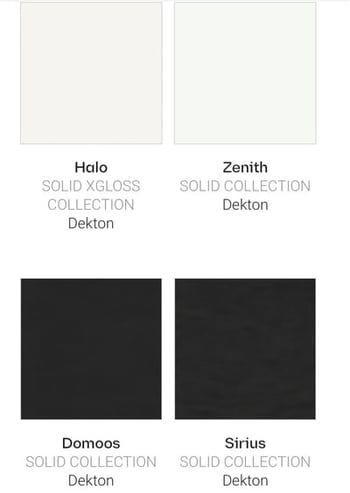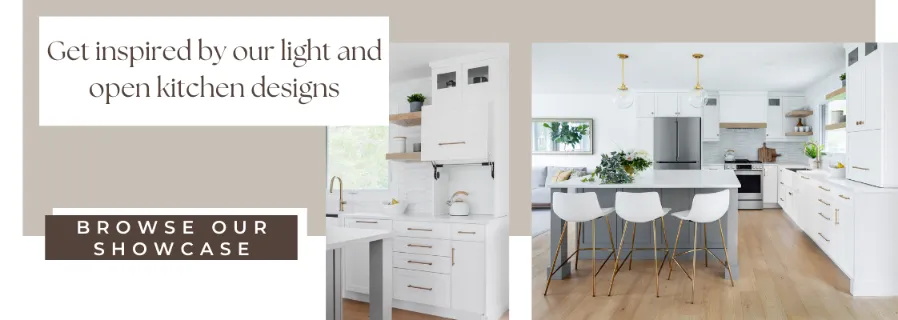11/04/2023 • Blog, Comparisons
Quartz vs. Dekton: Comparing Kitchen Countertops
Estimated Read Time: 8 Minutes
There might not be a more eye-catching kitchen feature than the countertops.
With so many stunning natural stones or beautifully engineered products to choose from, finding the right surface for your kitchen can be an overwhelming task. Making that final selection will come down to comparing the appearance, durability, prices, and availability of different materials.
Two 21st-century mainstays in the kitchen countertop world are Quartz and Dekton.
At Deslaurier Custom Cabinets, we specialize in custom cabinetry and kitchen design. While we do provide our own laminate countertops, we partner with reputable local countertop suppliers in Ottawa, like Urban Quarry, to ensure our clients have a vast selection of natural stone and engineered surfaces that will fit perfectly within their dream kitchen.
With that, let’s take a side-by-side look at Quartz and Dekton kitchen countertops, to help you determine which material is right for your home.
|
Table of Contents |
What are Quartz Countertops?
When it comes to kitchen countertops, Quartz is unlike anything else. Quartz itself is a mineral in the earth, but Quartz countertops are not considered natural stone surfaces like granite or marble.
Technically, quartz is an engineered stone countertop, meaning that while 93% of the surface is pure quartz, the remaining 7% of the stone is manmade. Essentially, what manufacturers do is grind up the quartz mineral and glue it back together with polymers and binders.
During the manufacturing process, fabricators will often add tiny flecks of glass or metals to the quartz to create extra visual appeal. Not only that, but they can also combine pigments with quartz minerals to develop slabs of all colours, like green, red, and blue.
Curious about how quartz measures up against a natural stone like granite? We have an article for that! Check out Quartz vs. Granite Countertops.
What are Dekton Countertops?
The new kid on the block, Dekton countertops, was released in 2013 to improve the performance of quartz surfaces.
Dekton was created by Consentino, a Spanish company that also manufactures surfaces like Silestone quartz countertops. Funnily enough, they actually have quartz in them!
Dekton is a blend of raw materials used to produce porcelain, glass, and quartz work surfaces.
Manufacturing Dekton utilizes a process referred to as “Sinterized Particle Technology,” which accelerates the metamorphic changes which occur in natural stone.
Essentially, instead of spending thousands of years under high pressure and high temperatures like natural stone, this high-tech option creates a synthetic replica using raw materials that can be used to create an amazing countertop.
Dekton counters are available in 5 different thicknesses: 4, 8, 12, 20, and 30 millimetres.
A nice feature of Dekton is that their slab sizes are generally much larger than conventional countertops, as the standard dimensions are 320 x 144 centimetres. These larger slabs aid in the visual continuity of patterns as well as reduce the number of joints that will occur.
Quartz Countertop Appearance
Quartz’s engineered fabrication process translates to endless style options.
Since additives, like pigment, are combined with quartz in the factory, manufacturers can create a full spectrum of aesthetics. You’ll find quartz in a diverse array of colours, patterns, and textures.

Caesarstone and Silestone are two premier brands in the field of quartz surface design. These forerunners in the industry aren’t shy about getting creative when forging quartz-resin mixes.
Caesarstone is known for incorporating semi-precious stones into its quartz countertops, while Silestone’s reputation is built on a whopping selection of hundreds of available colours.
Using this method of manufacturing, fabricators are able to manipulate quartz to mimic the look of natural stones, like marble. This allows quartz to offer a cost-effective imitation of a more expensive marble countertop.
No doubt, this design process is an extremely valuable tool when selecting the right countertop style for your kitchen.
Dekton Countertop Appearances
Thanks to Dekton’s replication of porcelain, glass, and quartz, it can provide a wide variety of distinct designs and styles as well.
Dekton kitchen countertops can come in solid colour slabs, or intricate designs and patterning. Dekton offers over 40 different colours to choose from in grey, black, white, brown, and cream hues.


Of the patterning available, popular styles include natural veining, natural grainy, metallic, industrial, and natural irregular.
Abundant edge styles are available for your Dekton countertops as well, including standard square or mitered profiles, decorative bevelled edges, and full and half bullnose edges.
Although these options are all available, Dekton manufacturers recommend bevelled edges to reduce the risk of chipping.
It should be noted that some edge styles may not work with patterned ultra-compact surfaces. Colour extends through the entire Dekton slab—but not the pattern or texture. Thus, the pattern may not be present with certain edge cuts. Luckily, mitered, squared, and eased edges look great for patterned surfaces.
As with other countertop material options, you have several choices for the surface finish. Dekton calls these “textures”. The finish textures include matte and glossy polished, but also some unique finishes like oxide, slate, leathered, and bush hammered.
For more information on various finishing techniques, check out our Learning Centre page where we have an article on Polished vs. Honed vs. Leathered Countertops!
Quartz Durability
The clear advantage of quartz countertops over 100% natural stone countertops, like granite or marble, is that quartz is non-porous, making it both stain and water-resistant. The resins incorporated directly into the manufacturing process function as a strong sealant, closing the small pores between minerals and providing built-in protection.
That means you don’t have to worry about routinely resealing your quartz surface! The non-porous, set-and-forget characteristics of engineered quartz are often a deciding factor for homeowners as the lack of maintenance is a key feature for a kitchen countertop.
Conversely, the biggest durability-related drawback to quartz is that it is not heat-resistant. Quartz countertops can typically only withstand around 175-185 degrees Fahrenheit, a far cry from the impressive numbers you’d find in most natural stone surfaces.
You can’t put down a hot pan or pot directly onto a quartz surface without running the risk of making permanent scorch marks. However, this shouldn’t be an issue if you routinely use heat protection like kitchen mats or boards.
Dekton Durability
Dekton countertops are world-renowned for their extreme durability. No other countertop material can compare to Dekton’s combination of heat, scratch, and stain resistance.
Like its quartz compatriot, Dekton is an entirely non-porous surface, impervious to water damage or stains. In fact, it’s so easy to clean and maintain that its manufacturers recommend nothing more than soap and water to clean it!
Dekton also has incredibly high scratch resistance. You won’t have to worry about kitchen utensils scratching your countertop. In fact, Dekton has such high scratch resistance that you can cut right on it and don't even need a cutting board!
Another impressive characteristic of Dekton countertops is their extremely high heat resistance. Dekton can withstand temperatures surpassing 550 degrees Fahrenheit! Almost tripling the heat resistance of quartz.
The only real durability concern is impact damage. If something heavy is dropped from a high enough point, or with enough force, it can dent or crack the Dekton surface. Unfortunately, a cracked Dekton countertop cannot be fixed. The only option is to replace the entire slab.
With that said, it takes a significant amount of force to cause a Dekton surface to crack, and any smaller impact damage like chips can be fixed!
High-impact damage aside, Dekton countertops offer a long-lasting surface with strong resistance to heat, scratch, or stain damage. All in all, if your main goal is finding a countertop material with the highest overall durability, Dekton is at the top of the list.
Cost of Quartz
Determining the cost of quartz, or any other stone countertop, is not an exact science. There are a number of uncontrollable variables that may affect the price of natural materials from one month to the next.
Therefore, the price of quartz can be influenced by quarry location, shipping costs, manufacturer and supply and demand.
So, how much are quartz kitchen countertops? According to Ottawa supplier Urban Quarry, the average cost of a quartz countertop falls between $80-$180 per sq. ft., not including installation fees.
This could wind up being anywhere from $2,000 to over $10,000, depending on the amount of countertop space you have, and the quality of quartz selected.
Cost of Dekton
Since Dekton countertops are such a durable and high-quality material, the price tag tends to reflect that; most options would not be considered a budget-friendly countertop choice.
Dekton surfaces can range from $80-$160 per square foot. It’s a much more expensive man-made alternative than, say, cost-effective laminate countertops. Generally speaking, the average cost for custom laminate countertops is from $24 to $36 per sq. ft.
Instead, the cost of Dekton will rival popular high-end kitchen countertops materials like granite, quartz, and marble.
Further, there are several factors that will influence the cost of Dekton countertops.
First, one full slab without a seam will be more expensive than multiple pieces that result in joints. Since it’s easier to manufacture smaller pieces, especially when dealing with corners, utilizing one full slab will increase the price of the total countertop.
Secondly, patterns and distinctive textures may cost more than solid colour Dekton countertops. This is because the design pattern is pressed onto the surface of the Dekton, rather than solid colours. Patterns and textures may also vary in intricacy and will increase the overall cost of labour.
Finally, the thickness of the countertop will naturally affect the price. Thinner slabs will be less expensive than thicker slabs, purely based on the amount of material that is required.
Accessibility
Since Dekton is still such a newcomer to the kitchen countertop industry, slabs are not as readily available as a popular mainstay like Quartz.
It's worth noting that not all countertop suppliers offer a wide selection of Dekton surfaces. However, large home improvement stores, such as Home Depot, generally have a good number of Dekton options in stock.
However, if you have a specific design or colour in mind, it's possible that you may need to look beyond these retailers to find the perfect Dekton countertop. Ultimately, it comes down to your priorities; if high quality and durability are your main concerns, the limited design options may not be an issue.
Conversely, Quartz countertops should be available at relatively every established countertop supplier. They’re arguably the most popular countertop surface of the past decade, and finding a supplier in your city shouldn’t be an issue.
What’s Right For You?
So, which kitchen countertop material is right for your home?
It depends!
Both products offer their own unique characteristics. If you want a virtually indestructible kitchen work surface, you’d be hard-pressed to find a better option than Dekton.
If you want a stone countertop that doesn’t require re-sealing like granite or marble, then Quartz is the way to go.
Ultimately, it’s important to always consider your personal style, household, and budget before purchasing a kitchen countertop.
|
Quartz |
Dekton |
|
|
Pros: |
|
|
|
Cons: |
|
|
Design with Deslaurier Custom Cabinets
As you can see, not every countertop material is the same. Both Quartz and Dekton offer beautiful kitchen surfaces that would look great in any home. We hope this article helped you determine which product is suited to your dream kitchen design.
If you have your eye on custom cabinetry to pair with your new Quartz or Dekton countertop, Deslaurier Custom Cabinets has everything you need. With over 40 years of experience in our name, we provide our clients with a fully customized design process with our talented team of designers.
Book a free consultation today with a Deslaurier kitchen expert at our Jupiter, Florida showroom!
Live outside the area? Find a Dealer to connect with near you! Interested in becoming an authorized Deslaurier dealer? Visit our Become a Dealer page to learn more!


